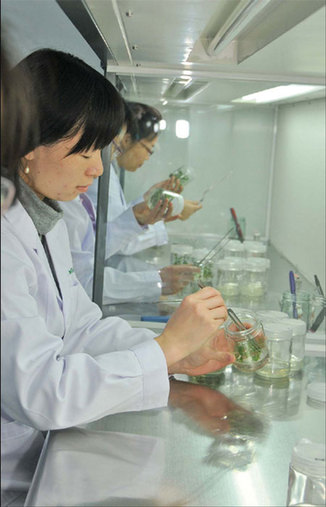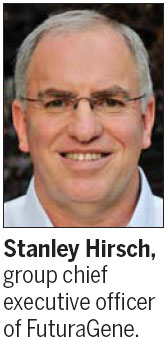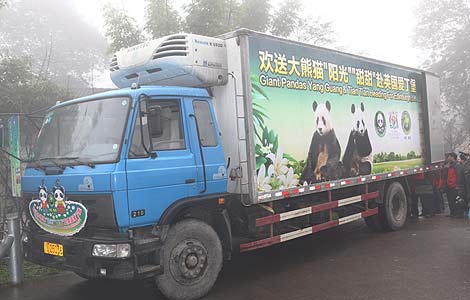Securing the future
Updated: 2011-12-02 11:03
By Zhang Haizhou (China Daily European Weekly)
|
|||||||||
Israeli agriculture biotechnology firm to sharpen genetic prowess in China
Stanley Hirsch's first trip to China was not a happy one.
 |
|
Work on the sterile tissue culture hood on eucalyptus plantlets. Provided to China Daily |
In 2003, Hirsch, group chief executive officer of FuturaGene, an Israeli agriculture biotechnology firm, made his first visit to China as part of his company's efforts to tap the huge market potential.
But the global leader in enhancement of yield and sustainability of woody crops for plantation forestry, biopower and biofuel market, could not make much headway in China due to the SARS outbreak in Asia. Only a good four years later did the company return to China.
Currently FuturaGene has crops including sub-tropical eucalyptus for the plantation-based pulp and paper industry and the short rotation energy poplar and eucalyptus for biopower and biofuel.
China has the second largest plantation of eucalyptus in the world after Brazil. Guangdong alone has an area of more than 677,300 hectares of eucalyptus. More than 90 percent of the diversifolious poplar trees in the world grow along the Tarim River in Xinjiang.
"I came back to China in 2006," Hirsch says, adding he had lost almost all contacts due to the long time-frame. But his company still managed to make a solid landing in the world's leading emerging economy since then.
Five years on, FuturaGene, which is registered in Britain, headquartered in Israel, and mainly operates out of Brazil and the United States, opened FuturaGene Biotechnology Co Ltd in Shanghai last month, and is using it as its headquarters in China.
The move highlights the company's long-term ambition in China, says James Zhang, vice-president of FuturaGene in China.
It also marks the company's decision to start research and development "independently" in China, rather than rely on existing partnerships, a key marketing strategy FuturaGene had relied on since 2006.
It has already managed to form a few key partnerships with leading research institutes in China.
In October FuturaGene reached an agreement with Beijing Forestry University to develop advanced plantation forestry for cheaper bioenergy, and signed another deal with Guangxi Academy of Sciences to develop sustainable bio-fuel processes for yield-enhanced eucalyptus.
 |
"My attitude was that I was going to go to look for the most central partners that I could find in China, and work with them on my technology, rather than trying to find the use for my technology without being in China," Hirsch says.
According to Hirsch the company is in China to "improve its genetics".
"We want to basically develop a very good collection of germplasm," he says, adding that the company uses its efforts "to develop a top-class genetic pool" in China.
"We are actively bringing our technology into China for the development of Chinese genetics," he says. "We are focused on the major sustainability issues in China".
FuturaGene has a team of 12 employees in China, and Hirsch says they plan to increase the number to 30 over the next 12 months.
The company's Shanghai headquarters has come at a time when China is hungry for more clean energy to reduce its reliance on coal. China, according to the National Energy Administration, consumed a total of 3.2 billion tons of coal, or 46 percent of the world's total, last year.
Late last month in Paris, delegates at the International Capital Conference pointed out high-tech companies will start looking for opportunities in China, as the economic recovery in the West remains sluggish.
According to experts, renewable energy and environmental protection sectors are the most promising sectors considering that there is an urgency in China for "green growth".
China's 12th Five-Year Plan (2011-2015), released in February this year, outlined the country's intent to upgrade its manufacturing sector, accelerate the growth of the service sector, and build a modern energy industry, all of which could benefit from collaboration with private-sector Western businesses.
Hirsch believes that FuturaGene has technologies that can improve the genetics of trees, and which fit China's hunger for green growth, and "could make a strong contribution" to help reverse desertification in China.
"We think there is a strong play here for looking at the desert as an opportunity. We are not only simply putting up trees to reclaim the land, but putting trees that you can benefit from," he says. Reversing desertification is main plank of FuturaGene's cooperation with Beijing Forestry University, Hirsch says.
"I think we have a major contribution in increasing China's forest productivity, which is currently less than that of Brazil," he says.
Hirsch believes that with better genetics and FuturaGene technology, the gap can be reduced significantly.
"If we can do those two things together: one, help reverse desertification, and, at the same time, produce a biomass resource, then it is a major benefit," Hirsch says.
What lies behind his confidence is his team's deep engagement in China.
Hirsch says he has made five or six field trips with the company's partners.
"Getting into a car, driving south from Guangzhou into the eucalyptus forests, and staying there for five, six, or seven days are part of that effort."
FuturaGene has a company in Xinjiang and a field trial farm that is about 100 km away from Kazakhstan. In November last year Hirsch and his team flew to the very small town. The temperature was as low as -15 and visibility just 10 meters, Hirsch says.
Finishing the trip, the team was trapped at the airport due to bad weather. "Nothing landed or took off for four days," he recalls, saying that the temperature dipped to -25 on some days.
The team spent four days rebooking flights, together with about 150,000 people.
Despite these unforgettable, sometimes unpleasant, experiences, Hirsch's company has high hopes for the Chinese market.
"If you want to be a serious international player, as the world develops, you have to have a presence in China," he says.
"China is huge. We are still small.We are strongly building ourselves today into being a lead player, or the lead player, in forest biotechnology."











